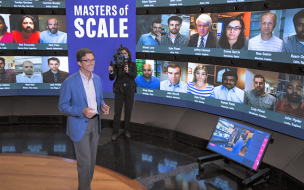In line with the United Nation’s (UN) Sustainable Development Goals, business schools all over the world are having to ramp up their focus on responsible management.
Matt Gitsham, associate professor at Hult International Business School and director of the Ashridge Center for Business and Sustainability, was present at the Rio+20 UN conference on sustainable development in 2012. There, he explains, business leaders were calling on business schools to integrate the notion of climate change, sustainability, and ethical management into their curricula.
The core of both the Hult MBA and Executive MBA program immerses students in today’s most pressing global political, economic, and environmental issues. And sustainability is integrated into the full spectrum of business courses across strategy, marketing, finance, and more.
The Business and Global Society course, led by professor Joanne Lawrence, is just one example. Joanne brings decades of experience into the classroom from her international corporate and consulting work as well her time spent as academic co-advisor to the UN Global Compact LEAD Program.
Most recently, Joanne, alongside Hult Executive MBA graduate Kevina Kenny, won the 2018 Best Case award in the Case Centre’s Ethics and Social Responsibility category. Their report looked into Unilever’s Sustainable Living Plan, gauging an understanding of how good business practices can produce sustainable revenue for organizations.
“Business leaders like Unilever’s Paul Polman see that solving problems of society as indeed the growth opportunity for companies,” Joanne says. “What happens in one country no longer stays in that country. From financial markets to climate change to inequality—the issues cross boundaries, and so must the solutions.”
Matt adds that there won’t be a “self-respecting” business school who isn’t adapting their curriculum to focus on these issues.
“CEOs need to grasp social issues around poverty, hunger, health, human rights, and climate change, and our students need to give sensible, serious thought to these issues before they graduate,” he says.
“All organizations struggle to lead change around sustainability, so having new recruits coming into these organizations who get the issues, understand them, and are passionate and motivated, is part of how the change happens.”
The Hult Business Challenge—in which students can either bring their own startup idea to fruition or try to find the best solution to a global corporation’s business problem—is a chance for students to practically transfer their knowledge to the real-life business world.
Fermin Carrillo Tovar, an MBA graduate from Hult International Business School, was part of the Siemens Hult Business Challenge winning team in 2017, alongside Guillermina Sanchez, Bharti Mathur, Ayushi Goyal, Adeboye Oye, and Mauricio Alarcon.
“The challenge was to create a business model for the future of energy,” explains Fermin. Students at Hult are challenged to find any opportunities they can to tackle the world’s biggest problems, hence Fermin and his team’s focus on sustainability.
They came up with the idea to scale up Siemens’ ability to distribute wireless electricity networks for electric vehicles, serving cities and local communities. They were mentored by Eric Giler, former CEO of WiTricity, and Katie Hall, the company’s former CTO.
The team was made up of students from an array of backgrounds—from marketing, to sales, auditing, operations, and engineering. The diverse perspectives on offer gave the team a holistic blueprint from which to design the business plan.
The Hult Prize also ignites the desire to solve global issues, inviting teams of students from around the world to come up with solutions to a set problem—2018’s theme is Harnessing the Power of Energy.
All of this translates into a school-wide mindset at Hult that highlights business taking responsibility for solving some of our times’ most testing issues. The school works closely with global corporations to ensure their students graduate with the needs of industry ingrained in their minds.
Fermin caught the sustainability bug—after graduating he moved from oil and gas firm Schlumberger to a project manager role at geothermal energy company Eden GeoPower.
In the US, he says, there are around one million abandoned oil wells. “They have the potential to produce geothermal energy,” he explains. “We see an opportunity here to supply energy to data and cryptocurrency centers, which take a lot of energy.”
Fermin originally targeted the MBA at Hult International Business School because he “wanted to expand [his] knowledge of current businesses, and the latest trending topics.”
“I didn’t think about the change to renewable energy before the MBA,” he concludes. “I made the decision after noticing there was a lot of research and interest in that field in Boston.”








